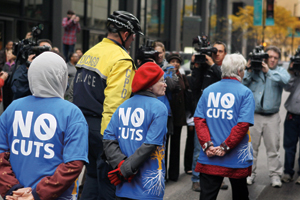CQ WEEKLY – VANTAGE POINT
Dec. 1, 2012 – 10:00 a.m.
Still the Third Rail
By Shawn Zeller, CQ Staff
There’s no budget deal in the offing yet, but just as anti-tax conservatives are rallying to hold Republican lawmakers in line against tax increases to avert the fiscal cliff, left-leaning advocacy groups are pressing their case that Democrats should refuse any “grand bargain” that puts cuts in Social Security and Medicare in play.

|
||
|
A coalition of liberal advocacy groups, unions and left-leaning religious organizations says Congress must not endorse the offer President
“I have never seen such a unified position,” says Alex Lawson, executive director of the group Social Security Works. “I don’t think anyone is going to waver from that very clear position that there should be no cuts to Social Security, Medicare or Medicaid.”
The liberal push-back adds another layer of complexity to the thorny talks about the Bush-era tax rates, cuts in domestic and military programs that would come with a sequester, and concern about the federal debt.
Lawson cites the election as justification for his stance, which some Democrats on Capitol Hill have backed publicly. “The election was a really solid statement,” he says. Lawson acknowledges that Obama previously endorsed the cuts and still won re-election, while Republicans who back cuts retained the House, but he insists that voters responded more positively to candidates who said they would fight entitlement cuts.
Last week, more than 100 members of the Service Employees International Union as well as dozens of members from the American Federation of State, County and Municipal Employees, the AFL-CIO, and the National Education Association held a lobbying day on Capitol Hill to argue for “jobs, not cuts.” The week before, three of those unions joined to sponsor TV ads targeting Democratic Sens.
Radio spots aimed at four Republican representatives,
Even if the Republicans don’t go along, says Chuck Loveless, AFSCME’s federal government affairs director, Democrats can wait until next year, after the tax cuts expire, to enhance their leverage in negotiations. “No deal is better than a bad deal,” Loveless says.
Meanwhile, the Leadership Conference on Civil Rights has asked its supporters to call their representatives on Capitol Hill to protest entitlement cuts, while a coalition of religious groups that includes the National Association of Evangelicals is pushing Congress to preserve welfare programs.
Leading Democrats are taking up that charge. Last week, Senate Majority Whip
Conservatives say Democrats risk overreaching. Senate Minority Leader Mitch McConnell of Kentucky says cuts in entitlements are a precondition for approving higher taxes. Some conservatives are sounding more like Obama did in his campaign, arguing that both new revenues and cuts are needed to get over the fiscal cliff. Liberal groups "are playing old-style politics, setting the line as far to the left as they can, hoping they can define where the center ends up," says Bill Wilson, president of Americans for Limited Government. "In normal times, that probably would work. In this case, they undercut the credibility of their president."